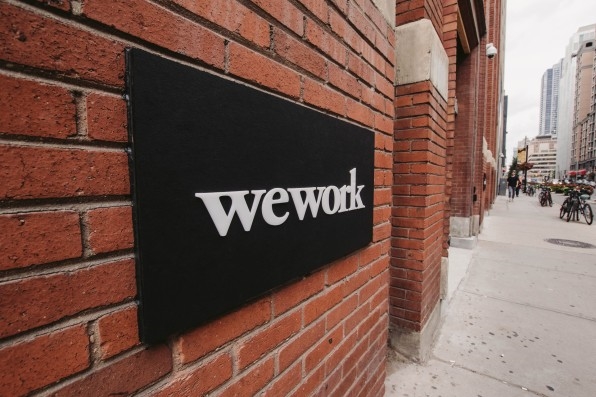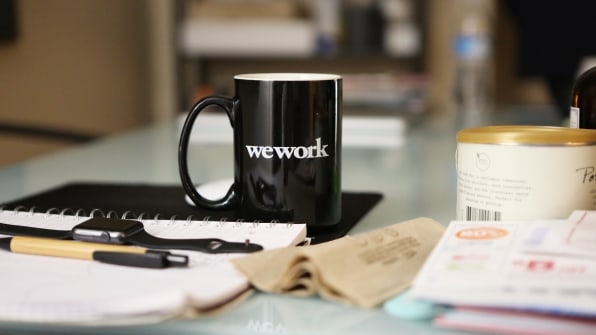The fall of WeWork’s Adam Neumann
By Katrina Brooker
It was a glorious spring morning in New York, and sunlight streamed through the windows of 115 West 18th Street. This is the global headquarters of The We Company, and I was there to meet with its CEO and cofounder Adam Neumann. He greeted me warmly as I was ushered to his office, and he gestured for me to follow him to a small room in the back of his workspace. He said he wanted to show me something.
He looked happy, smiling confidently, the way a guy sitting on top of company valued at $47 billion might.
The room in the back was small, Spartan—a stark contrast from the bustling We headquarters just beyond. It had one window, overlooking a small alley. A whiteboard sat in the corner and was covered with scribbles. Neumann blocked it with his long arms and politely asked me not to look. These were his private thoughts, he said. He comes here to meditate as well as to pray, he told me, nodding toward some beads lying on a small table. With his long black hair and T-shirt that read Always Love, it was very easy to picture Neumann sitting here in lotus pose, chanting mantras.
Hanging above the couch was what he brought me here to see: a massive picture of himself. It was not quite life-size—Neumann, as all profiles note, is 6’5?—but it took up most of the wall. Neumann was on a surfboard, gliding over a glassy sea. His lithe, athletic build, jet-black hair, and intense expression were striking.
But something else caught my eye. The water looked oddly flat. There was no curl or barrel or crest. It was hard to tell if there was a swell actually forming. I asked if he remembered how big the wave was. “Huge,” Neumann replied immediately and emphatically. I looked again. He seemed to sense my confusion and launched into an explanation about the position of the photographer, the reef, how the ocean moves. I don’t know much about surfing, and I wanted to move on with our interview, so I let it drop.
Looking back on this moment, knowing what I now do about Neumann, I realized that I had seen a side of him that was significant: He was insisting that others see his version of the world. He said the wave was huge, so it was.
It was this force of personality that built him and his company.
It also tore him down.
The fall of Adam Neumann has been so swift and sudden, it’s hard to grasp fully. Publicly, his descent began on August 14, with the release of The We Company’s jaw-dropping IPO prospectus. The document revealed a bleak picture of the company’s financial state: $900 million in losses in the first half of 2019; $47 billion in lease obligations; its revenue was effectively doubling annually but its expenses were such that no matter how much it grew, We was losing $1 for every dollar it made; and its corporate governance, which included granting Neumann’s wife the ability to name his successor if something happened to him, raised eyebrows even among people used to founders having outsize power. There were other issues as well. Rett Wallace, CEO of the analyst firm Triton Research, told Bloomberg, “The prospectus is a masterpiece of obfuscation.”
Investors expressed little interest. Subsequent reports indicated that We had to lower its asking price from one which would have valued the company at $65 billion all the way down to $10 billion before deciding on September 16, 25 days after the S-1 document was publicly shared, to delay the stock offering.
Two days later, the Wall Street Journal chronicled a number of incidents of questionable judgment by Neumann, and six days after that, on September 24, he was ousted from his job. Artie Minson, the company’s former chief financial officer, and Sebastian Gunningham, former vice chair, were named co-CEOs that same day.
How did a guy who started the year running one of the most highly valued private companies in history end up here?
If the stories emerging from Neumann’s tenure at We were scripted for a lurid soap opera, they’d be tossed out as too outlandish. There’s his marijuana use, his private jet, his strange family dynamics, celebrity friends, and a Japanese tycoon who gave him $10 billion. The full extent of the chaos and problems that marked Neumann’s reign over We are still unfurling. In both Neumann’s leadership and the company he’s left behind, we are seeing just the tip of the iceberg.
What’s increasingly clear, however, is that Neumann’s undoing began well before this summer’s fiasco on Wall Street. Through interviews with executives across different divisions and regions of the company, a complicated picture of Neumann emerges. (A Neumann spokesperson, citing quiet-period restrictions, could not provide comment.) He had a real shot at greatness. His vision for his company was so compelling that he transformed the real estate industry in ways that will reverberate for years to come. But money, fame, and hubris in the end led to bad decisions, a toxic work culture, and now, a company on the brink.

?Heightened expectations
In 2008, at the nadir of the global financial crisis, Neumann and his cofounder, Miguel McKelvey, began renting temporary office space to freelancers, startups, and anyone else who needed a place to work. More than just desks and chairs, what the young entrepreneurs believed they were selling was a respite from the chaos of the outside world. It was a clubhouse of sorts, where other young strivers could work together, collaborate, and feel less alone. To foster this sense of belonging, WeWork hosted happy hours, group yoga, inspirational speakers, and other social events.
From the beginning, the rise of WeWork has both fascinated and confounded outsiders. The company seemed only to go in one direction: up. Between 2010 and 2019, its membership grew from 450 to 527,000. That upward trajectory attracted the attention of rich and powerful people, who began circling around Neumann, telling him things that all young, broke entrepreneurs want to hear: He would be one of the greats.
“WeWork is the next Alibaba,” Masayoshi Son, CEO of SoftBank, declared last August, shortly after writing Neumann a fresh billion-dollar check. It was a heady comparison: Son had invested $20 million in the nascent Chinese e-commerce startup in February 2000; Alibaba’s market cap is now $500 billion.
Son’s money and clout helped give Neumann an aura of invincibility and an imperative to grow even faster. “You need to think bigger,” Son told Neumann, according to a former WeWork executive who was privy to the nature of their conversations. Neumann opened more and more locations and launched a myriad of new ventures, to prove his and his company’s worth to his investor. The more WeWork grew, the more money it needed, and the more Son was willing to provide, ultimately investing more than $10 billion by January 2019 in both equity and debt and via both WeWork and international joint ventures. The company’s valuation climbed to $47 billion, and after Uber went public in May, WeWork was the most valuable venture-backed company in the United States. Neumann—and those around him—became increasingly convinced of the company’s destiny in reshaping the future. (SoftBank declined to comment for this story.)
“Like Steve Jobs, he is very good at seeing the big picture,” Walter Isaacson, the author of Jobs’s biography, told me in May. He did not respond to a request this week for further comment.
A different kind of company
“One day when we go public, it’s not going to be a technology IPO, it’s going to be a new type of company, which in the future we will have more and more, because entwining physical and digital has never been more important,” Neumann told me back when he still felt sure of his position at the top.
Neumann had total control over the company’s direction. The company jet, which featured prominently in that Wall Street Journal article before Neumann’s ouster, was accounted for as an equipment charge in financial statements, and was used almost exclusively by him and his family. His management could be imperious. Some describe being made to wait outside his office for hours to meet him. And he was not the kind of boss who welcomed debate or different points of view. Insiders say that when they tried to persuade him against pursuing an idea or project, he would at times punish employees. They would lose their job titles, resources, or be relocated. “This is someone who did not ever want his reality to be pierced,” says one top executive who asked not to be named in this story. He, like other managers I interviewed, feared retaliation from both We and Neumann. “Their legal department does not play nice,” another employee explained.
People close to Neumann were starting to worry that the money, adulation, and celebrity were going to his head, clouding his judgment. Last winter, WeWork led a $32 million investment in a snack company started by surfer Laird Hamilton, one of Neumann’s friends. Laird Superfood sells coffees, coconut sugar, powdered drink mixes, and kombucha by the keg, among other things. One manager close to the transaction says the deal confused the internal investing team. It allocated capital that had been intended for technology investments. It also didn’t seem to fit with the company’s “space-as-a-service” business. One employee was told to hold off on a deal with a technology company because it was unclear where Neumann wanted to deploy capital.
Increasingly, Neumann seemed more interested in celebrity ventures.
Neumann told people that he had met with actor Hugh Jackman about a project, and Jackman was later spotted in WeWork’s offices. In August, Ad Age reported that WeWork and Ashton Kutcher, the actor and tech investor, had pitched NBC on a Shark Tank-style series based on WeWork’s Creator Awards. It was not picked up.

Searching for its Amazon Web Services
At a heated board meeting, Neumann clashed with his directors because they disagreed with his idea to start selling space to corporate clients. Board members worried that the company would be veering too far away from serving freelancers, startups, and the like. “You are all wrong,” Neumann told his board. The argument was moot: He had complete control over his directors as the company’s dual-class shares gave him a voting majority. By the time the meeting was over, he had approval for his plans.
Over time, WeWork added several enterprise offerings, including Custom Buildouts of company offices and private offices in unbranded WeWork buildings (known as headquarters by WeWork). Late last year, the company claimed that more than 1,000 large businesses used WeWork to offer its employees flexible work arrangements. It also stated that businesses with at least 1,000 employees comprised 25% of its membership. In its IPO prospectus, the company stated, “We expect enterprise to continue to be our fastest-growing membership type, currently representing 40% of our memberships.”
One project designed to appeal to enterprise customers was called Powered by We. Large companies could enlist WeWork to build and manage their offices and impute a WeWork-like vibe to workspaces. During WeWork’s global summit in 2018, Veresh Sita, who was at the time the “CWeO” of WeWork Enterprise and Powered by We, told the crowd, “You heard earlier speakers talk about [Powered by We] as our equivalent of AWS [Amazon Web Services]. We have built these amazing workplaces and we’re now able to take these workplaces into enterprises.”
A C-level executive with access to the company financials claimed that Powered by We generated $200 million in its first four months. WeWork hired top-tier talent in New York and Silicon Valley to work on Powered by We, and the division’s reference customers include such major corporations as BlackRock, Salesforce, and Microsoft. A FastCompany story last February stated that “since January 2018, WeWork has signed deals for 220 custom offices from a bank of 2,000 enterprise-level clients. . . . As of September 2018, it had generated $1.1 billion in revenue for leases and services.”
The business model for Powered by We, though, had problems. As a new venture, it was losing money. It only resembled Amazon Web Services in that it let enterprise customers save money from having to manage their own real estate, not in its high profitability. “Customers realized with Powered by We that WeWork was dumb enough to take on the costs of their construction and management,” says one manager.
Because Powered by We was losing money, Neumann grew impatient with it. In January, a proposed deal in which SoftBank would have invested $16 billion in We had fallen through. “We’re going back to scrappy,” Neumann told me back then, after SoftBank invested only an additional $2 billion. In the wake of that event, employees noticed that he seemed to be changing his mind frequently about strategy, projects, and employees.
With Powered by We, he shifted decision-making authority from headquarters to the WeWork regions. This caused tension and confusion between the managers. There were fundamental disagreements over how to implement the services. Neumann fostered the tensions by pitting some executives against one other. Now, as the company is attempting to distance itself from Neumann’s reign, the future of Powered by We is uncertain. Some insiders suggest it may be eliminated along with other Neumann-era projects, such as WeGrow, WeLive, and Rise by We.
Leadership questions
The Wall Street Journal reported one instance of Neumann’s pot smoking on a private jet, and it and other publications have chronicled instances of free-flowing alcohol at the company as well as Neumann’s enjoyment of top-shelf tequila.
Some employees now offer separate accounts of his use of marijuana and alcohol during work hours. One manager recalls Neumann smoking pot on the way to a meeting with one of the largest companies in the world. Another describes how before major meetings Neumann would, at times, drink heavily to soothe his nerves.
Neumann’s rages around the office were also infamous. “When people saw him coming, it was like the Red Sea parted,” one former executive recalls. “No one wanted to get in his way: You would either get berated or humiliated or asked to do some impossible task.” Calls in the middle of the night were common, as were tirades over infractions or perceived breaches of trust. For employees, this behavior was destabilizing. One manager recalls receiving an angry late-night call. The following day, Neumann apologized, promising it would never happen again.
“Adam had a Game of Thrones approach to management,” says one executive who worked closely with Neumann. One employee recalls Neumann telling him that colleagues were making disparaging remarks behind his back. In another instance, Neumann asked for volunteers to be the focal point of a “firing squad”-style meeting. This involved one manager agreeing to listen silently as others aired grievances about him or her.
At an offsite meeting, Neumann told the gathered managers that it had come to his attention that one of them in the room had betrayed him by authorizing the purchase of an expensive coffee machine. One person familiar with the episode says that Neumann, as in a scene out of an Agatha Christie novel, demanded that the guilty manager step forward. At another, in Montauk, New York, he told managers to join him for surfing at dawn. Later that day, he made clear he had noticed who had skipped the session, dividing them into a group separate from the rest. He pointedly referred to his fellow surfers as his “warriors.”
Adam’s enablers
Neumann ruled WeWork through a tight-knit crew, which included his wife, Rebekah; his brother-in-law Chris Hill, who served as chief product officer; and vice chairman Michael Gross. His wife, for example, wrote and edited parts of the IPO prospectus, according to company insiders.
Neumann also relied on a group of his friends from Israel, where he grew up. Arik Benzino headed up WeWork’s U.S., Canadian, and Israeli operations. Roni Bahar is a director of development. Ariel Tiger, who served in the military with Neumann, was once CFO and then an executive vice president. Zvika Shachar, a childhood friend, served as head of security at We and according to his LinkedIn also held the title “VP, Special Projects, CEO Office.”
Employees describe them as an intimidating group who were fiercely loyal to Neumann. They would often inexplicably and randomly turn up at meetings to listen. For example, one manager recalls two of them turning up at an administrative meeting in the IT department, sitting silently, then disappearing.
On Thursday, the real-estate publication The Real Deal reported that Gross, Bahar, and Shachar were all in the process of negotiating their exits from The We Company. Other reports have added that as many as 20 people considered to be Neumann’s closest allies inside the company would no longer be employed there, including his family members.

The new guard
To execute Neumann’s orders, he relied on his co-presidents, CFO Minson and Jen Berrent, who also served as chief legal officer. Former employees describe the duo as the people who transformed Neumann’s plans and ambitions into action.
Berrent, who was COO until April, was regarded as an intimidating figure around the office. Neumann relied on her to handle personnel changes, in particular. Part of what intimidated employees was that they believed she kept a list of people that Neumann wanted to be fired. Neumann was particularly sensitive about those who seemed disloyal or critical. Employees at all levels of the company management recount that firings at times seemed random and unexplained. There are currently three lawsuits pending against the company—one claiming age discrimination, and the other two allege sexual harassment. In July, employees staged a sit-in on the 6th floor of the New York headquarters to protest one popular manager’s firing.
Minson, as CFO, helped Neumann get the money he needed to grow his empire. Although Berrent led the negotiations on the first SoftBank deal in 2016, Minson also played a key role in securing the billions the company raised from the Japanese conglomerate and its Vision Fund for WeWork and its subsidiaries. Last spring, he was instrumental in helping the company issue a $700 million bond offering, which gave investors their first full peek at We’s financial condition. The offering included a confusing accounting metric called “community-adjusted EBITDA,” which many investors had trouble understanding as it excluded key operating expenses from parts of We’s income statement.
The board also catered to Neumann’s demands. Its directors allowed Neumann to be able to borrow millions from the company. Most recently, in April, The We Company lent him $362 million. Also under their watch, WeWork leased space in buildings in which its CEO had financial stakes, though Neumann was not involved in the negotiation of these leases.
Despite the billions he pursued, Neumann liked to convey that he wasn’t motivated by money. In January, when I asked him about his stock in the company, he told me that at that time he would not cash in his stakes. “I, Adam Neumann, am not a seller.” In mid-July, in advance of the pending IPO, the Wall Street Journal reported that Neumann had cashed out at least $700 million in cash and loans.
Now, with Neumann gone, it’s Minson, Berrent, and the board’s job to clean up their old leader’s mess.
After Adam
The collapse of The We Company’s IPO has created serious cash-flow problems. The company is racing to find financing to cover its costs for the next few months as it scrambles to get its IPO on track. Even if it manages to get another IPO offering out to the markets, it’s unclear how interested investors will be. In the wake of We’s troubles, demand for high-flying startups seems to have cooled: Peloton saw its stock drop 11% on its first day as a public company; Endeavor, which was scheduled to go public on Friday, has shelved its plans.
Meanwhile, Neumann is keeping his head down, for now. The week he was ousted, he was spotted at his home near Gramercy Park. Those who worked closely with him say they are concerned about how he will manage now. Neumann had become so accustomed to the spotlight and the expectation that he would be a major player on a global stage. “He and Rebekah really thought they were going to have this platform, and be on this level that other really important people are,” says another former executive.
In May, Bruce Dunlevie, a We board member and partner at Benchmark, talked to me about Neumann. He described him as a visionary, who kept pushing farther and faster into increasingly unknown territory.
“When Alexander the Great left Macedonia he didn’t know he was going to India. He was going to put down a revolt in Thrace,” he told me.
At the time, this seemed like praise. Dunlevie declined to comment further for this story, so I couldn’t ask him if he’d meant something else by the comparison. Students of classical Greece, though, might view it this way: The famous young warrior conquered the known world, but after one night of heavy drinking, he contracted a mysterious illness, died within weeks, and his empire subsequently collapsed under its own weight.
(83)



